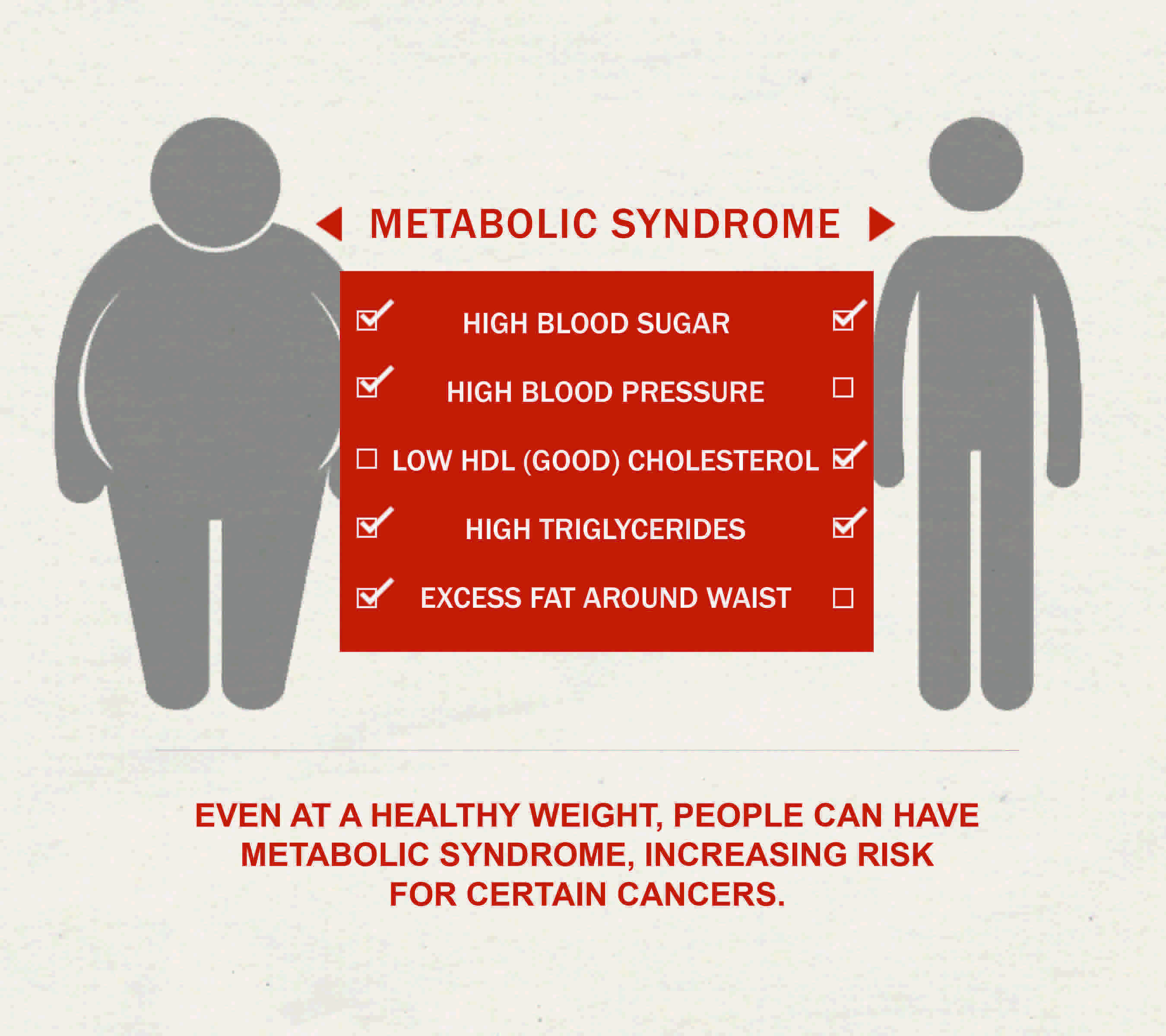Q: I’m a healthy weight, so do I still need to think about lifestyle to lower my cancer risk?
A: Yes! Overweight is a sign of increased cancer risk, but it doesn’t tell the whole story.
Overweight and obesity are now linked to at least 11 cancers. Studies suggest that this link reflects influences of chronic inflammation and elevated levels of hormones involved in metabolic processes, like insulin. But you can be a normal weight and still have the metabolic issues associated with obesity.
 About 1 in 3 U.S. adults have metabolic syndrome. This is defined by the presence of three or more of the following:
About 1 in 3 U.S. adults have metabolic syndrome. This is defined by the presence of three or more of the following:
- high blood sugar
- high blood pressure
- low HDL (“good”) cholesterol
- high triglycerides
- too much fat around the waist
This clustering of risk factors doubles risk of heart disease and increases risk of type 2 diabetes five-fold. Research also links metabolic syndrome with 20% to more than 60% increase in risk of several cancers, such as liver, colorectal, endometrial and postmenopausal breast.
Many people with metabolic syndrome are overweight. But not everyone. If you show features of metabolic syndrome despite a normal body mass index (BMI, a marker of weight) it’s categorized as “metabolically unhealthy normal weight” (sometimes called “metabolically obese normal weight”). Some estimates suggest that almost 1 in 4 normal-weight U.S. adults are metabolically unhealthy.
Recent studies have linked being metabolically unhealthy normal weight to increased risk of some cancers, including postmenopausal breast and colorectal.
One study for example, followed more than 5,000 normal weight postmenopausal women for 14-plus years. After adjusting for age and other known risk factors, compared to metabolically healthy women, metabolically unhealthy women (those with at least two features of metabolic syndrome other than waist size) had 49% greater risk of developing colorectal cancer.
Elevated fasting blood sugar and insulin resistance were strongly tied to this increased risk. When women with diabetes were removed from analysis, the link between being metabolically unhealthy and increased risk of colorectal cancer remained just as strong.
Findings like these contribute to awareness that although weight and BMI help identify people at risk of cancer (and other diseases), they are imperfect.
Since risk seems likely to stem from inflammation and elevated insulin, and perhaps even excess body fat around the waist despite a normal weight, here are some smart moves:
Avoid weight gain. Adult weight gain is common, but it’s much easier to prevent unwanted weight gain than to lose it. Keep active, limit time spent sitting, and work to avoid portion distortion that makes excessive portions of food and drink go unnoticed. One study found that weight gain of 5% or more over nine years of follow-up was linked to increased development of metabolic syndrome among normal weight adults.
Make time for some physical activity every day. Even with no change in weight, regular physical activity can help avoid unhealthy elevations of insulin and reduce inflammation. People with normal weight and overweight who get regular physical activity are more likely to be metabolically healthy.
Make healthy food and drink choices. Focus your choices around vegetables, fruits, whole grain, beans and nuts. These foods provide nutrients, phytochemicals and fiber that work together to reduce inflammation and support healthy levels of insulin and other cancer-linked hormones. Aim for an overall healthy eating pattern, with limited use of sweets, sugary drinks and refined grains. There are lots of different ways to create this kind of eating pattern, and all seem to promote overall metabolic health.
Get your shut-eye. Emerging evidence links lack of adequate sleep (generally less than seven hours a night on a regular basis) with increased markers of inflammation and insulin resistance, which can in turn drive elevated levels of insulin. Both are considered elements of being metabolically unhealthy.
Bottom line: Being a healthy weight is important. Let that give you the extra incentive to make smart lifestyle choices that will keep you — and your weight — healthy overall.
AICR HealthTalk is by Karen Collins, MS, RDN.






That’s good to know that weight gain of 5% was enough to increase risk of metabolic syndrome. I guess it pays to be regularly active. When you gain weight it becomes harder to do the exercise to lose it, after all.